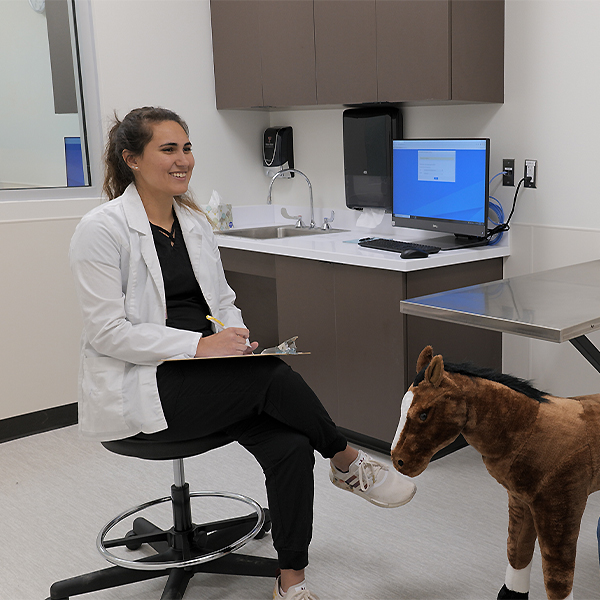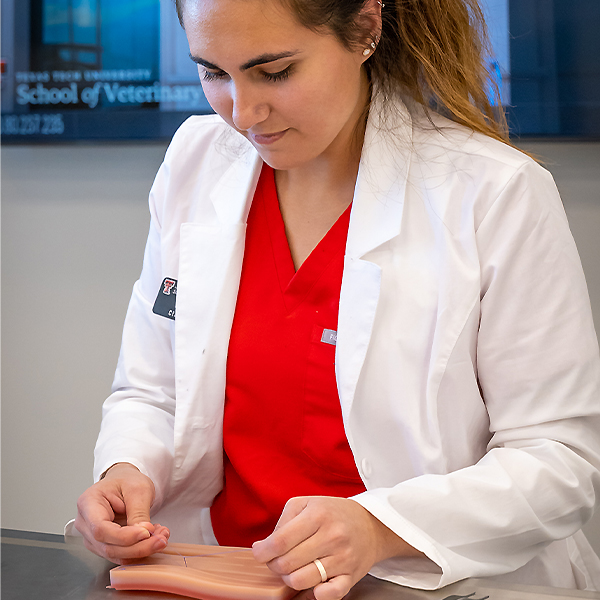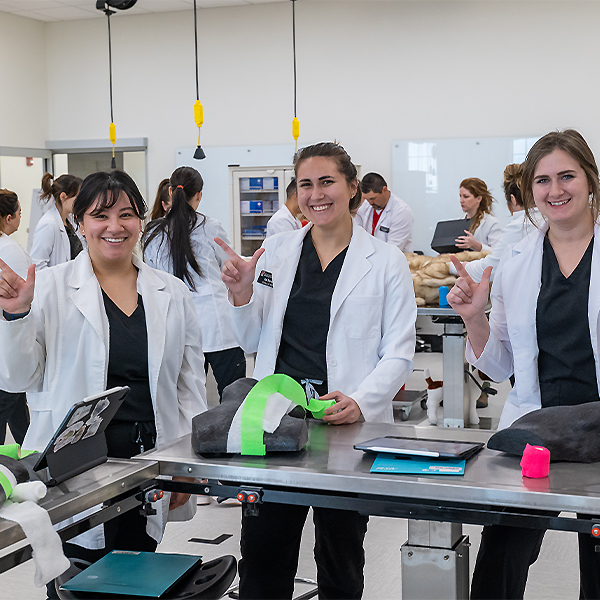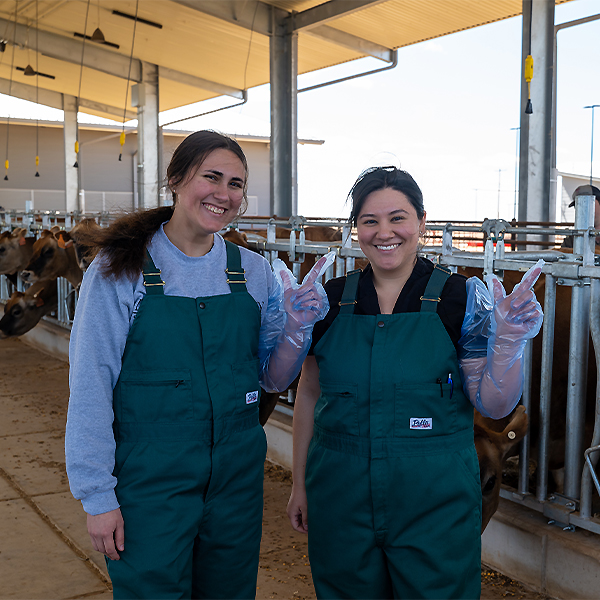
Val Trevino’s love for animals and people sparks an unrelenting passion to become a mixed animal practitioner.
For as long as Val Trevino can remember, she has been surrounded by agricultural life. She grew up in Edinburg, Texas and made frequent visits to her family's ranch in Tamaulipas, Mexico. She credits her upbringing as the catalyst for her unrelenting passion to pursue veterinary medicine.
Soon, Trevino found herself at College Station attending Texas A&M University. This is where she double majored in Biomedical Science and Animal Science.
Now, Trevino is part of the inaugural class at the Texas Tech University School of Veterinary Medicine in Amarillo. Let's get to know Val Trevino through a series of questions.
How did you become interested in veterinary medicine?
Both of my parents are from rural towns in Tamaulipas, Mexico, an area rich in agriculture and farming. Their parents both supported their families by working in the cattle industry as well as producing crops such as sorghum to sell and feed their livestock. My father decided to follow in my grandfather's footsteps, and he too now owns a cow-calf operation, breeds red Brangus cattle, and produces sorghum and corn. As a result, much of my family's free time was spent on our ranch, but I wouldn't have wanted it any other way. For as long as I can remember, while my siblings spent their time on the ranch playing video games or trying to stay out of the heat, I always wanted to be right by my father's side. Whether he was processing cattle, helping a cow with dystocia, or just taking a trail ride to check on our crops, I always wanted to learn and be involved as much as possible. While I didn't know at the time that I could make a career out of it, I knew that working alongside people to better the wellbeing of animals was something that I wanted to do for the rest of my life.
How does your previous life experience coincide with the School of Veterinary Medicine's mission?

Both my family's ranch in rural Mexico and being raised in south Texas allowed me to witnessfirst-hand the dire need for veterinarians in rural and regional areas. Our closest veterinarian in Mexico lived three hours away from our ranch, which made most emergencies almost impossible for her to manage. This meant that my father was often forced to make life or death decisions on his own, which resulted in great losses for my family if the limited knowledge and medications he had on hand didn't suffice. Even living across the border in south Texas, there were so few veterinarians that it was often weeks before we could be seen. Oftentimes, residents in the area were also forced to travel to Corpus Christi or beyond for emergency or specialty veterinary care. Coming to this realization has inspired me to pursue a career in veterinary medicine in order to make a difference in the availability of veterinary care in my community, and that is why the mission of Texas Tech's veterinary school to provide affordable education to students wanting to provide veterinary care to rural and regional areas of Texas coincides so well with my future career plans.
What led you to decide the School of Veterinary Medicine was the place where you wanted to pursue your career in veterinary medicine?
As an undergraduate, rumors often circulated about Texas Tech's efforts to open a veterinary school, which had not happened in over a hundred years in the state of Texas. As exciting as the opportunity would be, it was a feat that seemed nearly impossible to myself and many other pre-veterinary students. I remember so vividly the day that feat became a reality as I prepared to apply to veterinary school for my third, and what I told myself would be my final, application cycle. Upon learning more about the program and their mission to serve rural and regional communities, I was sold. I'm not a firm believer in coincidences, but it seemed almost like fate. I knew far too well what it was like to wait weeks to be seen for routine veterinary care, and to hear about the multiple veterinarians in the area unable to retire for fear that no one would take care of their clients in their absence.
What does it mean to you to be part of the inaugural class at the School of Veterinary Medicine?

Being a part of the inaugural class at the School of Veterinary Medicine is an honor, and one Itruly cherish every day that I get to walk into our state-of-the-art facilities. The vet school is the culmination of the hard work and dreams of so many statewide, and I am so thankful to be a part of a veterinary program that truly listens to the needs of its students.
How was your first-year experience at the School of Veterinary Medicine?
Being a part of the inaugural class, I expected there would be a learning curve for both the students and the faculty as together we navigated a brand-new curriculum and waited on construction delays due to the global pandemic. While there were a couple of trials along the way, we are truly blessed with the most supportive faculty and staff. All of our faculty and staff knew each and every member of my class by name, and they were always more than willing to take time out of their day to support us in our learning. Being eight hours away from my closest family members, including my husband, was incredibly difficult, but the mentorship program provided by the veterinary school and the sense of community that is fostered by the faculty, staff and students alike has made all the difference. I have truly enjoyed being a part of building the culture and traditions at the School of Veterinary Medicine. I am so excited for the future of this program and how the competent veterinarians I know it will produce will fill the need for veterinary care in the rural and regional areas across Texas and New Mexico.
What are your career plans after graduating the School of Veterinary Medicine?
My career plans after graduation are to practice at a mixed animal veterinary clinic. Like I mentioned, my father's main sources of income were based on agriculture and cattle, but he also raised chickens and Dorper sheep for our own personal consumption. No single day on our ranch was the same, and I hope to maintain that same variability in my future career.
How are you going to help the School of Veterinary Medicine achieve its mission?

I plan on helping the School of Veterinary Medicine achieve its mission by choosing topractice in a rural or regional community upon graduation. I also hope that as a mixed animal veterinarian, I can provide care to all the variety of animals that are in dire need of veterinary care in these communities to the best of my abilities.
What advice would you pass along to an incoming student at the School of Veterinary Medicine?
The first piece of advice I would give to an incoming student would be to enjoy your last summer of “freedom.” You have worked tirelessly to achieve this great accomplishment, and now would be a good time to take those vacations you missed out on or even just spend precious time with your loved ones. I know I felt very pressured to continue learning as much as I could before the start of vet school, but I promise, you will do plenty of studying once the semester starts. I would also highly recommend downloading Notability on your iPad, it will become your best friend. Lastly, I personally sought a lot of balance once I started vet school. I quickly learned that veterinary school is a LOT of work and requires a considerable amount of studying outside of class, but it was also very important for me to still take time for my hobbies. Veterinary school is meant to be challenging and it will more than likely take you some time to adjust to the volume of material being thrown at you, but always remember to give yourself some grace and know that there will always be someone at the veterinary school, whether it be faculty, staff or another student, more than willing to support you along the way.
